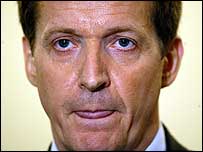Meanwhile...
British army joins battle to control Basra
Artillery attack on Mahdi army position in the city was 'something we were always prepared to do'
Mark Townsend and Gaby Hinsliff The Observer, Sunday March 30 2008
[]
Meanwhile, it has emerged that the British government is to defy an order to publish confidential minutes of cabinet discussions on Iraq that could shed new light on Gordon Brown's opinions in the run-up to the war. The Cabinet Office confirmed that it is appealing against last month's ruling by the Information Commissioner, Richard Thomas, that it must release records of two crucial cabinet meetings that were held in the critical days before the invasion. Opposition MPs had hoped that the notes would reveal the advice received about the legality of the war, but also precisely what Brown - then Chancellor of the Exchequer - said about military action.
There have been conflicting accounts of Brown's views. The late Robin Cook described him as making a 'long and passionate statement of support' for Tony Blair's strategy, while David Blunkett suggested in his memoirs that Brown came on board at the last minute after realising Blair might sack him.
Ministers are expected to argue to the information tribunal that cabinet decision-making would be compromised if they could not hold frank and private discussions and minutes should normally be exempt from freedom of information laws. The move comes days after Brown said he would hold an inquiry into how Britain went to war, but not while UK troops were in action, which could delay it until after the next election.
Ed Davey, the Liberal Democrats' foreign affairs spokesman, said the latest decision was part of a clear pattern over Iraq: 'They have obfuscated and put barriers in the way of truth about the war from day one, and it does leave the impression they have got something to hide.' While cabinet notes are only a partial record of conversations, he said releasing the March 2003 minutes would have held at least 'the potential that it might show what Gordon Brown said'.
The appeal against the release of cabinet minutes will be controversial because Cook, Blunkett, Clare Short and Alastair Campbell have all picked over the private discussions on Iraq in their respective memoirs.
http://www.guardian.co.uk/world/2008/mar/30/iraq.iraq
Artillery attack on Mahdi army position in the city was 'something we were always prepared to do'
Mark Townsend and Gaby Hinsliff The Observer, Sunday March 30 2008
[]
Meanwhile, it has emerged that the British government is to defy an order to publish confidential minutes of cabinet discussions on Iraq that could shed new light on Gordon Brown's opinions in the run-up to the war. The Cabinet Office confirmed that it is appealing against last month's ruling by the Information Commissioner, Richard Thomas, that it must release records of two crucial cabinet meetings that were held in the critical days before the invasion. Opposition MPs had hoped that the notes would reveal the advice received about the legality of the war, but also precisely what Brown - then Chancellor of the Exchequer - said about military action.
There have been conflicting accounts of Brown's views. The late Robin Cook described him as making a 'long and passionate statement of support' for Tony Blair's strategy, while David Blunkett suggested in his memoirs that Brown came on board at the last minute after realising Blair might sack him.
Ministers are expected to argue to the information tribunal that cabinet decision-making would be compromised if they could not hold frank and private discussions and minutes should normally be exempt from freedom of information laws. The move comes days after Brown said he would hold an inquiry into how Britain went to war, but not while UK troops were in action, which could delay it until after the next election.
Ed Davey, the Liberal Democrats' foreign affairs spokesman, said the latest decision was part of a clear pattern over Iraq: 'They have obfuscated and put barriers in the way of truth about the war from day one, and it does leave the impression they have got something to hide.' While cabinet notes are only a partial record of conversations, he said releasing the March 2003 minutes would have held at least 'the potential that it might show what Gordon Brown said'.
The appeal against the release of cabinet minutes will be controversial because Cook, Blunkett, Clare Short and Alastair Campbell have all picked over the private discussions on Iraq in their respective memoirs.
http://www.guardian.co.uk/world/2008/mar/30/iraq.iraq




















